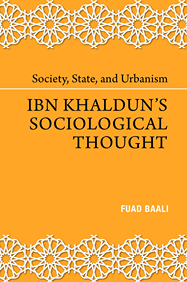Society State and Urbanism Ibn Khaldun's Sociological Thought
Material type: TextLanguage: English Publication details: Kuala Lumpur : Islamic Book Trust, 2018Description: xi, 175 p. : illISBN:
TextLanguage: English Publication details: Kuala Lumpur : Islamic Book Trust, 2018Description: xi, 175 p. : illISBN: - 9789670526492
- 181.5 BAA
| Item type | Current library | Shelving location | Call number | Copy number | Status | Date due | Barcode |
|---|---|---|---|---|---|---|---|
 Lending Collection
Lending Collection
|
Circulation Section | Circulation Section | 181.5 BAA | 28/12/2023 | Available | 98518 |
SUMMARY
This book probes the nature, scope, and methods of ilm al-umran, the new science of human social organization, as it is developed in Ibn Khaldun’s 14th century masterpiece, the Muqaddimah. It explores his ideas and observations on society, culture, socialization, social control, the state, asabiyah (social solidarity), history as a cyclical movement, urbanization, and the typology of badawa (primitive life) and hadara (civilized life or urbanism).
Through a comparative perspective, this study illustrates that Khaldun’s ideas about society have conceptually preceded those of Machiavelli, Vico, and Turgot, as well as those of Montesqueau, Comte, Durkheim, Gumplowicz, Spengler, Tonnies, and even Marx. Society, State, and Urbanism demonstrates that Ibn Khaldun’s thought is relevant to contemporary sociological theory, and that his very language differs little from that of classical and modern sociologists.
